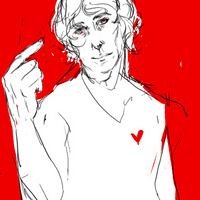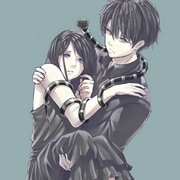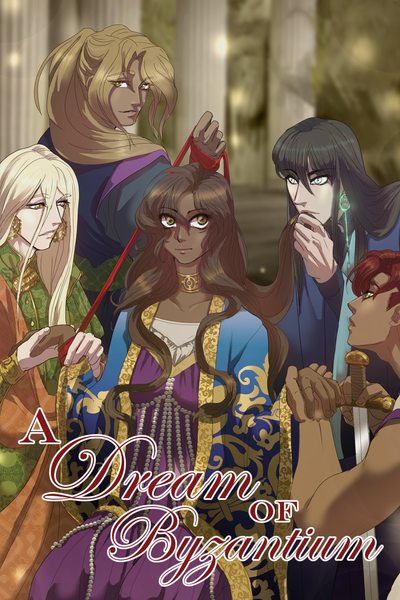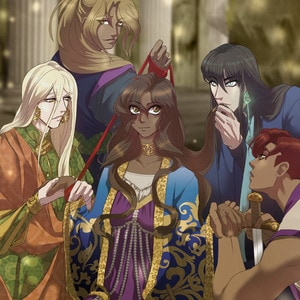It was fortunate that the tavern grew busier by the evening; Ophelia barely had the time to stop to catch her breath, or let her mind wander where it shouldn’t. Once or twice Felicia caught her worried look and promptly reassured her that Phobos was more than capable of looking after himself. It was not enough to comfort her; as she laid in bed that night, she wondered equally about the prince’s whereabouts and her strange worry for him. She hoped, perhaps, that he would be spared the fate of the rest of his party, and that the next morning the sun would not rise dripping in red.
The cock had yet to sing when she slipped into the kitchen to make some breakfast; Felicia and Lucio were only just getting ready as the noises of their toilette made evident. She heated some milk and added cinnamon and honey; this was, as Felicia had demonstrated to her the previous day, the closest thing they had to a morning coffee. She had moved to retrieve the warm porridge when she heard movement in the main room of the tavern.
She moved swiftly, expecting to see one man but finding another. Aristides was sitting on a bench, his shoulders slumped. As if every line had been carved, his face was hardened into a scowl, his eyes showing the deadened gaze of someone who had spent the entire night awake. He noticed her, and motioned for her to approach him.
“Death has laid its hand,” he said, almost guiltily. “Where you’re from, princess, whether that’s Hybernia, Elysium or Byzantium… do warriors stop their sword before killing men from their motherland? And if they don’t, what do they do to chase the nightmares away? As old as I am, I haven’t quite figured that out yet.”
“They live with it, I guess,” Ophelia replied, confused. “If they care enough, that is. I can imagine a lot of people don’t care. But regardless, there’s nothing about it that will undo taking someone’s live. It’s a burden to bear.”
The warrior hummed; he showed no particular agreement or disagreement with her response. Somewhat anxious at the topic at hand, Ophelia asked “Where’s Phobos?”
“He’s upstairs.”
She took one look at him before darting towards the stairs, her footsteps light and quiet. She felt a sense of foreboding thinking that, merely a day before, that had been the place where the betrayal had been laid out. Would the steps of the conspirators have left marks on the wooden floor, as if to signify that something wicked had taken place? Or perhaps it would be a stench in the room, or an eerie feeling of being watched…?
She felt strangely calm when her eyes laid upon the empty beds. At the end, the sole occupier of the room slept peacefully on top of the bedsheets. He had only taken off his boots; everything else was as it had been when he’d sheathed his sword the previous afternoon. He’d left ghostly footsteps behind; shadowy imprints onto the wood, specks of black onto the sheets. His scabbard was immaculate; the sword was lying on top of the desk, placed with such care and devotion it made it hard to believe that it had been brutally slaying his foes all night.
Ophelia closed the door behind her and went down to make breakfast for the morning crowd; seven of them had arrived to the tavern and only three remained, the blood of the traitors spilled over the floor like a strange consecration.
-
The sun rose to the tune of screaming and crying. The pillars of the temple had been desecrated: from each hung a body, and piled onto the steps were the rest. Their clothes had been torn, exposing to everyone that could see the intricate designs that only Phrygian men were said to imprint on their skin. The city was no stranger to violence, but it seldom saw anything of that gruesome nature. Mothers shielded their children as they rushed their steps; the orphans watched and murmured in fascinated awe, mimicking in a more open manner what the older and most decadent part of the populace were doing as they gathered around the scene.
Caudiceum whispered; soon, the magistrates of the city and its governors had descended upon the plaza, all wearing sombre expressions. To those in the know, this was a reflection of the troubled times of some of Caudiceum’s neighbours, and put the city in an awkward position. Being a free city, it had a certain level of authority and taxing rights while still being under the protection of the Iberian kingdom, which was a tributary and close ally of the Elysian Empire. But like any land that was given the right of self-governance, it also showed significant tolerance to those who were considered undesirable by both courts. Ports flourished on trade; those that stood far from the capital, did so mostly on illicit activities. Caudiceum, while certainly not one of the most lawless places in the kingdom, was tolerant of certain level of strange activity, as long as it brought business.
It was a well known fact that the Phrygian court was still undergoing a power struggle; the crown prince had recently gone into exile, and rebels and loyalists were both clashing to decide the future of their country. The massacre of the Phrygian men would certainly be a conversation topic in their hometown within the day; the governors in Caudiceum knew that they’d soon hear from the current king, as well as the Elysian ambassadors who had a stake in Phrygia’s civil war. That, everyone knew, would not be a pleasant conversation.
All of this went on without Ophelia’s knowledge. She heard from the men in the tavern that a gruesome discovery had the city aghast with horror; she knew who was the culprit, and what had led him to do it, but she could only catch glimpses of its potential ramifications. Phobos had slept all morning; it was early in the afternoon when Felicia gave her a bowl of fish soup and told her to bring it to his room.
“Don’t worry,” Felicia said, noticing her nervous expression. “He won’t be mad at you. And if he tries anything, well, remind him that you can do much worse.”
“How do you know him so well?” Ophelia asked before she could think, and realised too late it sounded almost accusatory.
“I’ve grown up in this tavern, and before it belonged to me it belonged to my parents,” Felicia winked at her. “There are certain secrets of the trade, if you will, and one of them is that you become very adept at reading your customers. And in reality, as handsome as he is, he’s not that complicated of a man.”
Ophelia decided to take her word for it, and accepted the bowl and the bread she was given. If Aristides’ lack of anger at her meant anything, perhaps there were bigger problems in the warriors’ minds than her origins.
As she walked up the stairs, she looked down and thought about the strange powers she was able to wield. As if it was a dream, she held up the bread in her left hand and let it go. Instead of falling, it hovered just below her palm obediently. She grabbed it again before walking down the hallway of the second floor, thinking that perhaps she ought not to be so afraid of Phobos’ sword after all.
“Uhm, I’m coming in,” Ophelia eased herself into the room like someone who was afraid to wake up a sleeping monster.
The exiled prince was sitting on the bed, filing away the edges of his sword. No bloodstains had been left on the floor, and the only signs of violence were the specks of blood on the sheets.
She left the bowl and the bread on the table. It was clear he was ignoring her: he didn’t look up from his task.
“You should eat it before it goes cold,” she didn’t know why she bothered; he was clearly not in the mood to talk. Something, perhaps slivers of compassion, prompted her to reach out to the brooding man.
“You don’t need to pretend to be nice to me.”
He looked up, eyes sharp and voice curt. “We’ll be gone before nightfall. We’ll never see each other again.”
Ophelia failed to see the connection. “And? You look like you’re not feeling well. Why should I not be nice to you?”
“It’s unnecessary.”
“I disagree,” the man huffed. “And anyway, where are you going? I thought you had been waiting to hear back from your contacts…?”
Phobos’ gaze hardened. “There never were any contacts; it was Ilmarinen who brought us here, only to put us in the hands of some loyalists.”
“Can’t you go into the port and find someone who can take you to that city… Arqa?” Before the other could respond, however, Ophelia reminded him of the food she’d brought by putting the bowl right before his eyes. He sighed, put the sword to his side, and took it.
“After this? Not likely. Two Phrygian men asking to be let on a boat is almost an admission of guilt, is it not? We’ll have to find another way out of the city.”
Ophelia pursued her lips as she watched the other eat. “You can’t stay, either?”
“There are many after me, princess. I must keep moving.”
He finished the bowl and held it out for her. His eyes and hands were immediately back on his sword the moment she took it back. She walked a few steps before she turned back.
“Is there anything I can do to help you?”
Phobos paused. “No,” he said, after a minute.
She left him alone. Later, as she was washing the blood off the sheets in the backyard she saw Aristides come in, cloaked and with a dejected expression in his face. Throughout the rest of the afternoon and into the early evening the conversation from the tavern’s patrons would keep her updated with the latest rumours: she heard about the magistrate taking the bodies into the court, of the initial speculation that it’d been some zealous Iberian nationalists taking out the enemies of their allies, of the city’s watchmen patrolling around, questioning everyone who had a story to tell. Felicia and Lucio said nothing of it all, clearly content to let the matter run itself into the ground at the hands of the city’s drunks.











Comments (0)
See all